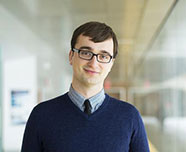 We invite you to read about one researcher’s perspective on end-user driven research, and the importance of developing strong interdisciplinary research teams to address complex water resource issues. This interview highlights Dr. Branko Kerkez, Assistant Professor in the Department of Civil and Environmental Engineering at the University of Michigan. Dr. Kerkez is the co-investigator of the Water Center supported project, A new sensor platform for the measurement of evaporation across the Great Lakes.
We invite you to read about one researcher’s perspective on end-user driven research, and the importance of developing strong interdisciplinary research teams to address complex water resource issues. This interview highlights Dr. Branko Kerkez, Assistant Professor in the Department of Civil and Environmental Engineering at the University of Michigan. Dr. Kerkez is the co-investigator of the Water Center supported project, A new sensor platform for the measurement of evaporation across the Great Lakes.
Q: In a few sentences, briefly describe your current water research and area(s) of expertise.
A: Our group works on the intersection of water and technology, with the goal of building the next generation of “intelligent” water systems. We deploy large-scale sensor networks and analyze big data to answer fundamental research questions across various scales of water systems, from the Great Lakes to the household. Some examples include using robots to monitor hypoxia, wireless sensor networks to study remote watersheds, drifting buoys on the great lakes, and sensor networks for the real-time control of water quality and flooding in urban stormwater systems. Each member of our lab is educated through the [College of Engineering’s Civil and Environmental Engineering] Intelligent Systems curriculum, which helps them develop a mastery of a water domain, as well as expertise in a variety of other disciplines, such as electrical engineering and computer science.
See: Lab Website
Q: How have you engaged end users in your water research and how has this improved your work?
A: Broader engagement forms the starting point for all of our research projects. Over the past three years, we have formed and maintained strong partnerships with a variety of national, state, and local groups, including NOAA, the City of Ann Arbor, Huron Riven Watershed Council, and Washtenaw County. These collaborations have provided critical context for our work and have guided us toward ensuring that each project has a meaningful impact.
Q: What challenges and opportunities have you encountered in water research and how have you approached them?
A: My biggest opportunities have always presented themselves as collaborations. The most fruitful of these collaborations have also been accompanied by the largest challenges, the biggest of which related to finding a common language to cross the disciplinary gap. Fortunately, such challenges can be overcome by a dedicated group of students and collaborators.
Q: From your perspective, what are the critical components for impactful water research?
A: The most critical component of our research is the continued engagement with stakeholders and fellow researchers. For our lab this often means separating what sounds technologically “cool” from what actually makes sense for a given water application. While we love to build wireless widgets and sensors, we always do our best to remain cognizant of the limitations of engineered technologies as the sole solution to water problems.
Q: What do you see as the future of water research—both in your area(s) of expertise and beyond?
A: Some of the most compelling research questions are at the intersection of disciplines. Their answer will require collaboration between disparate groups. It’s my opinion that instilling the next generation of students with a broad and interdisciplinary education will go a long way toward posing and answering such questions. I am depending on this actually, because I hope that one of them will finally develop a cheap and reliable phosphate sensor.